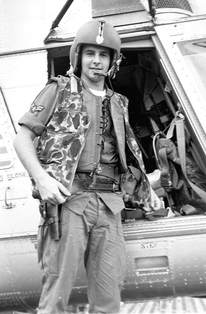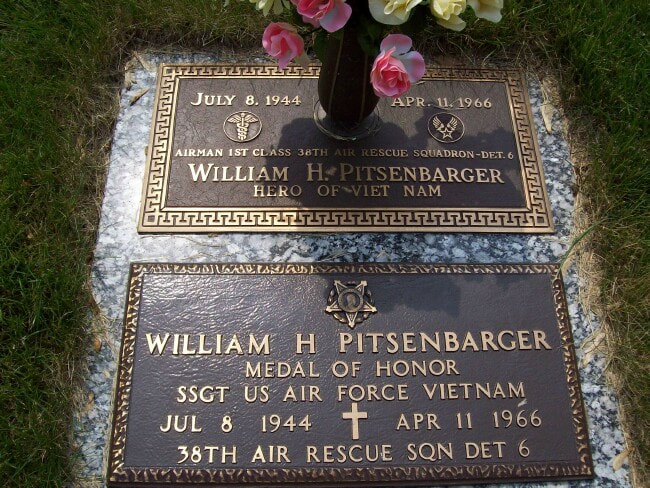
William Hart Pitsenbarger (July 8, 1944 – April 11, 1966)
Birth: Jul. 8, 1944
Piqua
Miami County
Ohio, USA
Death: Apr. 11, 1966, Vietnam
Vietnam Congressional Medal of Honor Recipient. He served in the United States Air Force during the war in Vietnam as an Airman First Clas in Detachment 6 of the 38th Aerospace Rescue and Recovery Squadron, stationed at Bien Hoa Air Base, Republic of Vietnam. He was awarded the CMOH for his bravery near Cam My on April 11, 1966. His citation reads "Airman First Class Pitsenbarger distinguished himself by extreme valor while assigned as a Pararescue Crew Member, Detachment 6, 38th Aerospace Rescue and Recovery Squadron. On that date, Airman Pitsenbarger was aboard a rescue helicopter responding to a call for evacuation of casualties incurred in an on-going firefight between elements of the United States Army's 1st Infantry Division and a sizable enemy force approximately 35 miles east of Saigon. With complete disregard for personal safety, Airman Pitsenbarger volunteered to ride a hoist more than one hundred feet through the jungle, to the ground. On the ground, he organized and coordinated rescue efforts, cared for the wounded, prepared casualties for evacuation, and insured that the recovery operation continued in a smooth and orderly fashion. Through his personal efforts, the evacuation of the wounded was greatly expedited. As each of the nine casualties evacuated that day were recovered, Pitsenbarger refused evacuation in order to get one more wounded soldier to safety. After several pick-ups, one of the two rescue helicopters involved in the evacuation was struck by heavy enemy ground fire and was forced to leave the scene for an emergency landing. Airman Pitsenbarger stayed behind, on the ground, to perform medical duties. Shortly thereafter, the area came under sniper and mortar fire. During a subsequent attempt to evacuate the site, American forces came under heavy assault by a large Viet Cong force. When the enemy launched the assault, the evacuation was called off and Airman Pitsenbarger took up arms with the besieged infantrymen. He courageously resisted the enemy, braving intense gunfire to gather and distribute vital ammunition to American defenders. As the battle raged on, he repeatedly exposed himself to enemy fire to care for the wounded, pull them out of the line of fire, and return fire whenever he could, during which time, he was wounded three times. Despite his wounds, he valiantly fought on, simultaneously treating as many wounded as possible. In the vicious fighting which followed, the American forces suffered 80 percent casualties as their perimeter was breached, and airman Pitsenbarger was finally fatally wounded. Airman Pitsenbarger exposed himself to almost certain death by staying on the ground, and perished while saving the lives of wounded infantrymen. His bravery and determination exemplify the highest professional standards and traditions of military service and reflect great credit upon himself, his unit, and the United States Air Force". Originally awarded the Air Force Cross, Congress subsequently upgraded his award to the Medal of Honor after a variety of eyewitness accounts of his valor were provided. It was presented to his parents on December 8, 2000 at Wright-Patterson Air Force Base, Ohio, making him the second Air Force enlisted member to earn the nation's highest honor. The Pitsenbarger Sports Complex at Piqua, Ohio, the Pitsenbarger Dining Hall at Wright-Patterson Air Force Base and Pitsenbarger dormitory at Dover Air Force Base are named in his honor. The Air Force Sergeants Association annually confers a "Pitsenbarger Award," which recognizes an Air Force enlisted member for heroic acts on or off duty that save a life or prevent serious injury". He is also presented in a commemorative display at the United States Air Force Museum. His name can be found on Panel 06E, Line 102 of the Vietnam Wall Memorial in Washington, DC. (bio by: Warrick L. Barrett)
Birth: Jul. 8, 1944
Piqua
Miami County
Ohio, USA
Death: Apr. 11, 1966, Vietnam
Vietnam Congressional Medal of Honor Recipient. He served in the United States Air Force during the war in Vietnam as an Airman First Clas in Detachment 6 of the 38th Aerospace Rescue and Recovery Squadron, stationed at Bien Hoa Air Base, Republic of Vietnam. He was awarded the CMOH for his bravery near Cam My on April 11, 1966. His citation reads "Airman First Class Pitsenbarger distinguished himself by extreme valor while assigned as a Pararescue Crew Member, Detachment 6, 38th Aerospace Rescue and Recovery Squadron. On that date, Airman Pitsenbarger was aboard a rescue helicopter responding to a call for evacuation of casualties incurred in an on-going firefight between elements of the United States Army's 1st Infantry Division and a sizable enemy force approximately 35 miles east of Saigon. With complete disregard for personal safety, Airman Pitsenbarger volunteered to ride a hoist more than one hundred feet through the jungle, to the ground. On the ground, he organized and coordinated rescue efforts, cared for the wounded, prepared casualties for evacuation, and insured that the recovery operation continued in a smooth and orderly fashion. Through his personal efforts, the evacuation of the wounded was greatly expedited. As each of the nine casualties evacuated that day were recovered, Pitsenbarger refused evacuation in order to get one more wounded soldier to safety. After several pick-ups, one of the two rescue helicopters involved in the evacuation was struck by heavy enemy ground fire and was forced to leave the scene for an emergency landing. Airman Pitsenbarger stayed behind, on the ground, to perform medical duties. Shortly thereafter, the area came under sniper and mortar fire. During a subsequent attempt to evacuate the site, American forces came under heavy assault by a large Viet Cong force. When the enemy launched the assault, the evacuation was called off and Airman Pitsenbarger took up arms with the besieged infantrymen. He courageously resisted the enemy, braving intense gunfire to gather and distribute vital ammunition to American defenders. As the battle raged on, he repeatedly exposed himself to enemy fire to care for the wounded, pull them out of the line of fire, and return fire whenever he could, during which time, he was wounded three times. Despite his wounds, he valiantly fought on, simultaneously treating as many wounded as possible. In the vicious fighting which followed, the American forces suffered 80 percent casualties as their perimeter was breached, and airman Pitsenbarger was finally fatally wounded. Airman Pitsenbarger exposed himself to almost certain death by staying on the ground, and perished while saving the lives of wounded infantrymen. His bravery and determination exemplify the highest professional standards and traditions of military service and reflect great credit upon himself, his unit, and the United States Air Force". Originally awarded the Air Force Cross, Congress subsequently upgraded his award to the Medal of Honor after a variety of eyewitness accounts of his valor were provided. It was presented to his parents on December 8, 2000 at Wright-Patterson Air Force Base, Ohio, making him the second Air Force enlisted member to earn the nation's highest honor. The Pitsenbarger Sports Complex at Piqua, Ohio, the Pitsenbarger Dining Hall at Wright-Patterson Air Force Base and Pitsenbarger dormitory at Dover Air Force Base are named in his honor. The Air Force Sergeants Association annually confers a "Pitsenbarger Award," which recognizes an Air Force enlisted member for heroic acts on or off duty that save a life or prevent serious injury". He is also presented in a commemorative display at the United States Air Force Museum. His name can be found on Panel 06E, Line 102 of the Vietnam Wall Memorial in Washington, DC. (bio by: Warrick L. Barrett)
